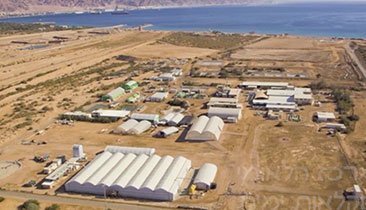Objective: Development and transfer of know-how for Israel’s mariculture industry and associated biotech industries.
Core Activities:
- Pilot project for evaluation of the commercial feasibility of environmentally-friendly technology for rearing fish in land-based seawater ponds.
- Development of land-based polyculture systems (fish and other organisms).
- Domestication of new species of fish and other marine organisms.
- Genetic improvement of mariculture species.
- Pathobiology – identification, prevention and treatment of diseases in mariculture systems.
- Development of technologies for production of biochemicals from marine organisms.
- Development of novel technologies and products for the aquaculture industry.
- Technology transfer and scientific support to commercial mariculture and biotechnological enterprises.
The National Center for Mariculture in Eilat (NCM) (Malhai), is situated on the northern coast of Eilat. NCM is dedicated to advancing technologies for the cultivation of economically valuable sea fish and other marine organisms.
NCM comprises nine research groups focused on the intricate process of “domesticating” marine creatures for agricultural production.
Its research spans multiple scientific disciplines, including ichthyology, fish breeding, genetic enhancement of fish populations, formulation of fish and fry diets, fish disease detection, prevention, and treatment, development of intensive fish farming systems, as well as integrated cultivation systems involving fish, shellfish, and algae.
A significant research endeavor at the NCM centers around the development of environmentally friendly techniques for rearing fish in land-based seawater ponds. This technological innovation encompasses the biological treatment of effluents from these ponds. Some of the treated effluents are redirected to breeding systems, while the remaining portion is discharged into the sea without causing detrimental environmental impacts. The completion of this development will enable the establishment of large-scale commercial aquaculture farms along the southern Arabi coast of the Mediterranean Sea. To assess the economic feasibility of this technology in practice, a project has been initiated to cultivate fish in pre-industrial-scale ponds, with an annual production capacity of 100 tons.
Malhai employs approximately 50 researchers and research assistants specialized in various marine biology fields and related scientific disciplines. Additionally, both local and international higher education institutions collaborate with Malhai, enabling student researchers to conduct postgraduate studies under the guidance of the center’s experts. NCM also engages with universities, research institutions, and commercial enterprises worldwide that focus on marine agriculture and marine biotechnology. The NCM’s activities extend to training programs and professional consulting services aimed at supporting the development of aquaculture in developing countries.
The research facilities at the NCM comprise analytical laboratories for chemical and biological analyses, as well as laboratories equipped for conducting biological experiments and feasibility studies using flowing seawater in tanks and ponds.
Research outcomes and developments at NCM are disseminated to entrepreneurs through knowledge transfer agreements. NCM researchers offer expert advice and ongoing support to entrepreneurs during the implementation of acquired knowledge. To date, based on the knowledge gained from fish farms in Eilat and along the Mediterranean coast, several ventures have been established. These include fish farms utilizing cages in the Gulf of Eilat, a farm dedicated to cultivating edible snails along the Mediterranean coast, as well as experimental fish farming facilities in ponds located in the Eilat area and along the Mediterranean coast. Moreover, two “Incubator companies” collaborate with marine researchers at Malhai to develop biotechnological products for the aquaculture industry, such as specialized food products for fry and a product aimed at enhancing the fish reproduction process.




